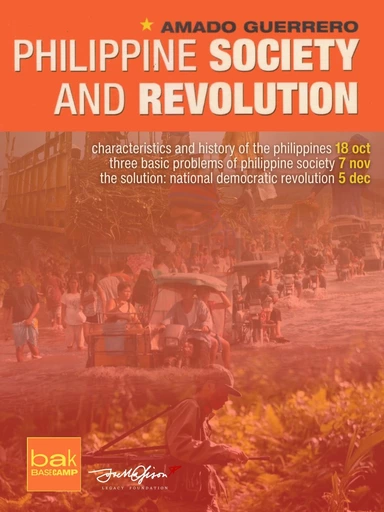
18 October 2025, 17:30 - 21:0
a Short Course on Philippine Society and Revolution
reading, presentation and discussion
Assembling in Resistance with the Jose Maria Sison Legacy Foundation
Throughout 3 sessions, The Joma Sison Legacy Foundation will coordinate the facilitation of the Short Course on Philippine Society and Revolution (SCPSR). SCPSR is a course developed and continuously updated since the 80s for all the people that can be aroused, organized and mobilized for the NDR. SCPSR is thereby the first part of a larger curriculum of courses which all aim to improve the skills and capacities of those in the NDR movement (PADEPA).
The material of the course is largely based on Philippine Society and Revolution (PSR). This is a book written by Jose Maria Sison when he lead the re-establishment of the Communist Party of the Philippines which greatly re-invigorated the struggle of Filipinos for their democratic interests and their people's genuine independence. The book outlines the characteristics of Filipino society (which remains relevant up till now), the problems plagueing said society and how the NDR solves those issues.
The sessions will consist of (order TBD):
A presentation of SCPSR
A discussion of the course matter
A dinner break and mingling
Smaller breaks in between and mingling
The readings for this session cover the introduction and Chapter one of the book Filipino Society and Revolution (p1-71), you can find the e-book here
Let us know if you’re coming by sending an email to joining@bakonline.orgÂ
Dinner will be potluck style, so please bring something to share for the table!
Suggested donation for your participation is between €5-10
About the Jose Maria Sison and the JMS Legacy Foundation
Jose Maria Sison, or Ka Joma, was a great Marxist thinker and practical leader of the Philippine revolution. Sison’s life-long work as a great thinker and practical leader of a revolutionary movement has not only changed the course of Philippine history as it pertains to the Filipino people’s struggle for national and social liberation but has also inspired and influenced progressive and revolutionary movements around the world.
His wide and solid knowledge on philosophy, political economy and social science and their application in understanding the world in order to transform it, places him among the ranks of great thinkers and revolutionary leaders of his time.
Jose Maria Sison’s legacy must be preserved for current and future generations in the struggle of humankind to build a new and better world. This is the ambition and purpose of the Jose Maria Sison Legacy Foundation. The Foundation oversees several components which work together to carry out the mission of the Foundation: a museum, the archives and library, the Jose Maria Sison website, and a schedule of events that use these various components as a venue to share Ka Joma’s works with the world.
Through research, publications, exhibits, events, and public education, the Foundation aims to promote and share the legacy of Jose Maria Sison for all revolutionaries, activists, scholars, and seekers of a just society.
About Assembling in Resistance
Assembling in Resistance is a programmatic line curated by artist and organizer Iliada Charalambous. During these gatherings, participants learn together about forms of coming together in and for resistance by reading collectively with and about diverse resistance movements, alternative forms of (self)governance and assembling.
How can we apply what we learn in the context of Basecamp?
[id: a cover of the book Philippine Society and Revolution by Jose Maria Sison, a collage of scenes of Filipino people, in the middle a scene of people in traffic on an overflowed street, on the bottom a soldier carrying a gun, on the top a cart filled with wood, all covered with a red filter]